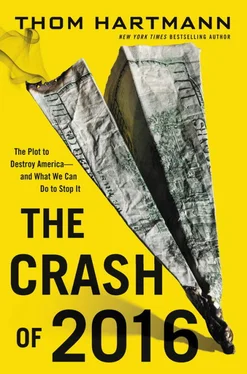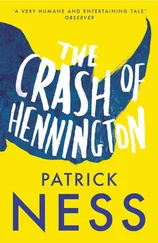Their first opportunity came in Chile in 1973.
General Augusto Pinochet outsourced the work of building a new economy in Chile to Milton Friedman and the Chicago Boys.
Friedman’s “Chicago Boys” were eager to help General Pinochet in Chile. It was their first big gig, and Milton Friedman went to Chile with a plan to radically remake the depressed economy.
They would immediately privatize government industries, cut spending, and open up Chilean markets to free trade. No more Keynesian economics, in which the government kept greed and monopoly under control: The Chicago Boys handed the millionaires in Chile the golden key to the country’s treasury and said, “Get to work.” There would be no gradual repairs. The Chicago Boys would simply sink the ship and build a new one.
As a result, the Chilean economy collapsed (as has happened every time this sort of thing has been tried, anywhere in the world, throughout world history), and this time there was no longer a social safety net to help people. The unrest in the country grew, and so did the violence.
But to the Chicago Boys, this was all part of the plan. They knew reforms would be painful, and for them it was “no pain, no gain.” But the Chicago Boys had a different definition of “no pain, no gain” and it went something like this: If the vast majority of the population doesn’t experience the pain of immediate economic reform, then the very few people who make up the wealthy elite won’t see their gain of massively greater wealth.
Orlando Letelier was a diplomat and economist who escaped Pinochet’s bloody coup in Chile and fled to Washington, DC. In 1976, three years into the Chicago Boys’ experiment in Chile, Letelier penned an article in The Nation entitled “The Chicago Boys in Chile: Economic Freedom’s Awful Toll.” As the title suggests, Letelier exhaustively outlined Friedman’s failures in his home country.
Letelier points out that, two years into Pinochet and the Chicago Boys’ rule, inflation had reached 341 percent—higher than anywhere else in the world. The price of goods increased by 375 percent. GDP decreased by 15 percent. Agriculture production sputtered to a grinding halt. Export values dropped 28 percent and Chile acquired a $280 million trade deficit. And to top everything off, Chile’s unemployment rate skyrocketed from 3 percent—among the lowest in that hemisphere—before Friedman stepped foot in the country to more than 10 percent and, in some parts of the country, as high as 22 percent after Friedman left. 48
Letelier concluded by writing, “Three years have passed since this experiment began in Chile and sufficient information is available to conclude that Friedman’s Chilean disciples failed.”
But judging the success of an economy based on economic indicators isn’t how the Chicago Boys rolled. They judged success another way, as Letelier indicated: “But they have succeeded, at least temporarily, in their broader purpose: to secure the economic and political power of a small dominant class by effecting a massive transfer of wealth from the lower and middle classes to a select group of monopolists and financial speculators.”
All of these economic pains took place under the backdrop of a dictator willing to kill anyone who showed the slightest opposition to Friedman’s economics. And that included Orlando Letelier, who was assassinated in 1976, when a Pinochet hit squad rigged his car with a bomb.
Despite the wave of violence and abysmal economic indicators, the Chicago Boys were happy with what they accomplished. It would be a common theme elsewhere around South America and the former Soviet bloc, as so-called crises were exploited and new economies “of, by, and for the rich” began to develop under the guidance of the Chicago Boys and others who subscribed to Friedman’s economic “shock therapy.”
According to the criteria of the Economic Royalists, Friedman’s Chilean experiment was a resounding success. And with the Great Forgetting taking hold, the corporatist intellectual community around the world was warming up to the same old Royalist policies that had wrought so much pain generations earlier.
Just as Friedman was busy running the nation of Chile into the ground in 1974, his mentor, Friedrich Hayek, emerged from the shadows to be recognized by the central bank of Sweden with their Nobel Prize for Economics.
The bank intended to solely honor Swedish socialist Gunnar Myrdal. Myrdal is perhaps best known for his book An American Dilemma: The Negro Problem and Modern Democracy , a book written about race relations in America in 1944 that would serve as the basis for the US Supreme Court’s decision in the Brown v. Board of Education case.
But the bank feared that it would be criticized for “home cooking” by selecting a fellow Swede, so they threw Hayek into the ceremony as well. That decision didn’t sit too well with many in the global economics community, including Myrdal, who thought of Hayek, with his free-market ideology, as a radical wingnut. As did most people at the time.
But Daniel Yergin, author of the book Commanding Heights , recounts this story and sheds some light on its significance saying, “[T]he award documented the beginning of a great shift in the intellectual center of gravity of the economies profession toward a restoration of confidence in markets, indeed a renewed belief in the superiority of markets over other ways of organizing economic activity.” Yergin noted, “Within a decade and a half, the shift would be largely complete.”
Two years later, the Nobel economics prize was awarded to Milton Friedman alone in 1976. The changing of the guard was complete.
As with Hayek’s coronation, no one was happy with the decision to honor Milton Friedman that year. Chile was in chaos, and tens of thousands had been murdered at the behest of Pinochet. As a result, Sweden was flooded with protestors condemning Friedman and the Swedish Central Bank.
Friedman’s wife, Rose, recounted the couple’s trip to receive the award in a 1998 article entitled “One Week in Stockholm,” which ran in the Hoover Digest . Rose describes a hostile environment in which she and her husband were under constant threat. She wrote, “From that moment until we left, we were never without our two bodyguards. In addition, our room was under surveillance day and night by other police. Not even a maid, we discovered, was permitted to enter our room without a police escort!” 49
Former recipient of the prize Gunnar Myrdal, who had shared the honors with Hayek two years earlier, was appalled and called for the abolishment of the Swedish Bank’s Nobel Prize for Economics.
But despite all the grievances, the neoliberalism movement was now afoot and had gained legitimacy—and the Royalists were thrilled. As Daniel Yergin noted, “a great shift” was now under way.
Three years later, Margaret Thatcher, a devout follower of Friedman’s economic philosophy, would rise to power in the United Kingdom, deregulate her nation, open up the markets, and cut government spending.
The “Crisis” Comes to America
My wife, Louise, and I had moved to Detroit in the summer of 1973 so I could take a job with RCA that offered health insurance, as Louise was pregnant with our first child. We lived in Westland, a western Detroit suburb on the glide path to the Detroit airport, in a tiny rented house.
In early October 1973, Egypt (with the help of Syria) attacked Israel in what is now known as the Yom Kippur War. Israel fought back and routed their opposing forces, taking large chunks of Egyptian land during the Six-Day War. Because the United States was backing Israel, the Arab world was outraged, and a couple of weeks after the October 6 attack, OPEC’s ministers met and announced they were cutting off their exports of oil to the United States and a few other countries. That embargo lasted until March 1974, although its effects continued to echo for years.
Читать дальше












